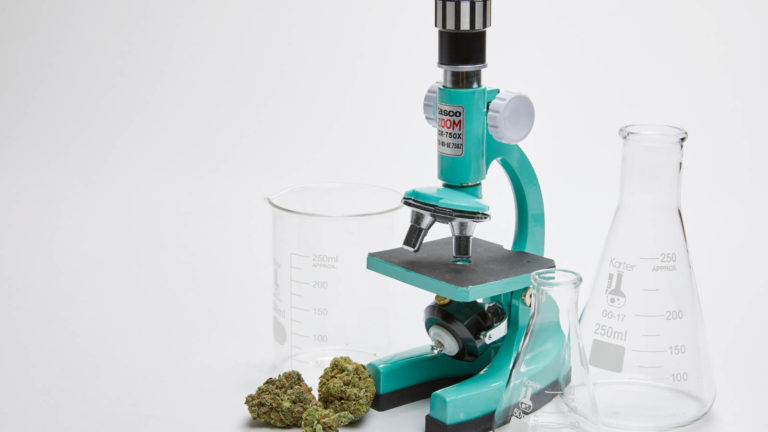Though dementia can in itself be an ailment, it is often symptomatic of another underlying condition. Alzheimer's, Parkinson's, and Huntington's are a few diseases that may present with dementia. These diseases are progressive and cannot be cured.
Cannabidiol (CBD) has shown in some studies on rodents and other animals to reduce brain inflammation and the death of brain cells. This may, in turn, lessen the symptoms of dementia. For people suffering from dementia, mainly the elderly, CBD oil could provide a wave of hope for a desperate condition that robs the individual of memory and cognition and, thus, the ability to function in daily life.
Research overview
A number of recent studies have provided promising evidence for the use of CBD to treat dementia. These studies encompass the dementia-related diseases of Alzheimer's, Parkinson's, and Huntington's, as well as vascular dementia. To date, no large-scale clinical trials have been conducted on humans.
The studies
CBD oil for dementia and Alzheimer's disease
A 2017 literature review published in Frontiers in Pharmacology examined preclinical evidence for the therapeutic properties of CBD in treating Alzheimer's disease. The authors concluded that, “The studies reviewed in this mini-review provide 'proof of principle' for the therapeutic benefits CBD and possibly CBD-THC combinations pose for AD therapy.”
 Photo by: Gina Coleman/Weedmaps
Photo by: Gina Coleman/WeedmapsImage lightbox

CBD oil for dementia and Parkinson's disease
“Is cannabidiol the ideal drug to treat non-motor Parkinson's disease symptoms?” asked researchers in a 2019 study published in the European Archives of Psychiatry and Clinical Neuroscience. The signature symptom associated with Parkinson's disease is tremors, but these researchers were interested in understanding how the other symptoms, namely dementia, could decrease with CBD.
Researchers analyzed six studies that suggested that CBD has a neuroprotective effect on Parkinson's disease patients. As with the Alzheimer's disease study, researchers noted that CBD was well-tolerated by individuals with Parkinson's disease, but noted that the sample sizes were small and the CBD treatments were short. The authors recommended more clinical trials to assess CBD's safety.
CBD oil for dementia and Huntington's disease
This inherited disorder is characterized by the death of brain cells leading to dementia that sometimes begins with mood swings. A 2016 clinical trial performed at the University of Madrid found that Sativex, an oral spray containing CBD, was safe and well-tolerated but did not identify a change in symptoms. Researchers suggested in an abstract published in the Journal of Neurology that higher doses of Sativex could yield different results.
CBD oil for vascular dementia
Impaired blood flow to the brain precipitates problems with reasoning, judgment and memory for individuals with this type of dementia. In that regard, a 2016 study published in the journal Cellular and Molecular Life Sciences found that activating CB2 (cannabinoid) receptors in the brains of animals could improve blood flow to that region. Activity in the brain cells increased while damage to the cells decreased, according to researchers. However, the researchers did point out the need for scientific studies to be performed on the human brain.
Patient perspectives
Warren Josefson is poised to celebrate his 85th birthday, but he can't remember that the milestone is on the horizon. His wife, Addie, told Weedmaps in a phone interview that her husband started showing signs of Alzheimer's in his mid-70s. Since then, when he had minimal short-term memory loss, the decline has been steep, she said. Even worse, Josefson's dementia has caused him anxiety and distress in his lucid moments.
 Photo by: Gina Coleman/Weedmaps
Photo by: Gina Coleman/WeedmapsImage lightbox

CBD oil, which Josefson uses both orally and topically, has not made his memory return, according to his wife, but it has made him much calmer and happier.
Addie Josefson explained: “My husband's attitude towards life has improved since our son suggested we use CBD oil. We're old-fashioned and were very hesitant at first, but I'm relieved that we tried the CBD oil. I wish that the CBD oil could make Warren into the man he once was, but there's no magic potion. At least he's enjoying life more, and things are easier for me!”
What the experts say
Some experts in the field of Alzheimer's disease are giving the green light to CBD oil to soothe the anxiety that often accompanies dementia.
CBD oil has captivated the attention of the general public as well as that of major organizations, including one dedicated to supporting Alzheimer's disease patients. While the Alzheimer's Society of the United Kingdom contends that there is no evidence for the slowing or ceasing of dementia through CBD oil, the organization does state that cannabidiol could be helpful in managing other symptoms.
According to the organization's website: “Research does suggest that high concentrations of CBD oil could be useful for managing some of the symptoms of dementia such as agitation and anxiety.”
Indeed, cannabis is emerging as an alternative to anxiety medications for its calming properties. Whether cannabis and CBD oil will also go mainstream as a direct course of treatment for dementia remains to be seen.
Bottom line
Research is unveiling multiple potential benefits of CBD in treating dementia and dementia-symptomatic diseases, such as Alzheimer's, Parkinson's and Huntington's. Most research with CBD has been conducted on rodents or other animals, and researchers recommend clinical trials for humans to evaluate the cannabinoid's effectiveness.

